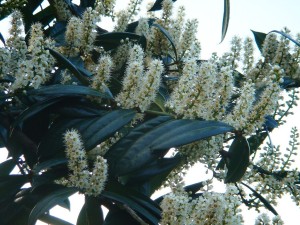Prunus laurocerasus, also known as cherry laurel, common laurel and sometimes English laurel in North America, is an evergreen species of cherry (Prunus), native to regions bordering the Black Sea in southwestern Asia and southeastern Europe, from Albania and Bulgaria east through Turkey to theCaucasus Mountains and northern Iran.
Contents
Uses
Used to alleviate snorring.
Benefits
The fresh leaves are antispasmodic, narcotic and sedative. They are of value in the treatment of coughs, whooping cough, asthma, dyspepsia and indigestion. Externally, a cold infusion of the leaves is used as a wash for eye infections. There are different opinions as to the best time to harvest the leaves, but they should only be used fresh because the active principles are destroyed if the leaves are dried. Although no specific mention has been seen for this species, all members of the genus contain amygdalin and prunasin, substances which break down in water to form hydrocyanic acid (cyanide or prussic acid). In small amounts this exceedingly poisonous compound stimulates respiration, improves digestion and gives a sense of well-being.
Cautions
No side effects are recorded.
Interactions
- Please consult your doctor.
Other names
Cherry Laurel, Cerasus laurocerasus, Laurocerasus officinalis, Padus laurocerasus
References
Source: NaturalMedicinalHerbs, http://www.naturalmedicinalherbs.net/herbs/p/prunus-laurocerasus=cherry-laurel.php
Wikipedia, https://en.wikipedia.org/wiki/Prunus_laurocerasus

